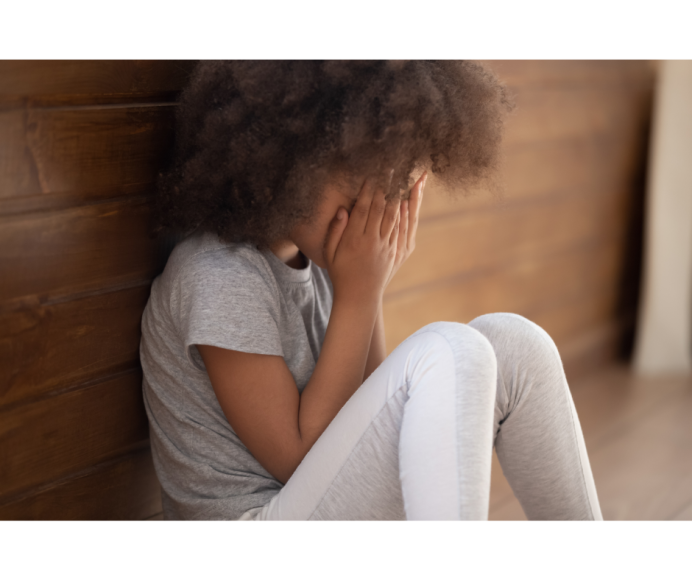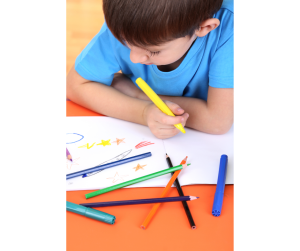“Children don’t choose to melt down. A meltdown is the lower brain’s solution to overwhelm. The child has reached a threshold of tolerance and temporarily cannot meet the demands of the environment. We can help by offering presence and compassion—first for ourselves and then for our child.”
-Robbyn Peters Bennett
Summer has officially concluded, and we are likely well into our fall routines. Kids are back to school, sports/extracurriculars are plentiful, and it seems like every weekend is packed with various activities. It is of no surprise that because of all of this, fall is professionally my busiest time of the year in working with patients—more school refusal, emotional reactivity, and behavioral challenges present alongside the return to school. Regardless of the manifestations, there is one foundational reason for such a significant uptick in these behaviors: ANXIETY.
 Being a psychiatric provider specializing in pediatric populations, one of the most predominant diagnoses I address is anxiety. But to the general layperson, anxiety and pediatrics don’t always connect. I love that our generation acknowledges that children and teens can experience mental health challenges. Some of us know all too well that this was not always the case; these difficulties were often minimized or even wholly ignored because, well, as a child, “what does he/she have to be worried about?” So, I applaud us for breaking some of these generational curses that existed before us.
Being a psychiatric provider specializing in pediatric populations, one of the most predominant diagnoses I address is anxiety. But to the general layperson, anxiety and pediatrics don’t always connect. I love that our generation acknowledges that children and teens can experience mental health challenges. Some of us know all too well that this was not always the case; these difficulties were often minimized or even wholly ignored because, well, as a child, “what does he/she have to be worried about?” So, I applaud us for breaking some of these generational curses that existed before us.
Anxiety is like any other condition that requires attention and sometimes, additional treatment. It has a genetic predisposition, and environmental factors contribute to its presentation. Now, I want to be clear that feeling anxious and nervous DOES serve us for adaptive reasons and can be completely normal, as all children experience anxiety. We have a nervous system that keeps us aware of any external threats, and it serves as a source of intrinsic motivation to adhere to specific life guidelines (i.e., deadlines and successful performance). The concern is when these feelings of anxiety are so prevalent that they significantly impair daily functioning, such as causing prominent distress with separating from caregivers, school refusal, or making social connections.
 Just like us, children and adolescents can have anxiety regarding many things. Often, anxiety can be triggered by some of the following:
Just like us, children and adolescents can have anxiety regarding many things. Often, anxiety can be triggered by some of the following:
- New/uncertain situations
- “What if” thoughts/verbalizations, including many worries about things before they happen
- Constant worries or concerns about school performance, friends, or sports
- Being on time
- Catastrophic events
- Fears of embarrassment or making mistakes
Of course, this isn’t an exhaustive list, but we all get the idea. Some kids need constant reassurance, and others may be “people pleasers” for fear of disappointment. Another presentation is IRRITABILITY, DEFIANCE, AND AGGRESSION. I type this with emphasis. Sometimes, what appears as defiance is unmanaged anxiety, ESPECIALLY with children. Fully transparency: I often become pretty easily frustrated with minor things and irritable towards those I love when I’m anxious and overwhelmed. Sound familiar? Now consider a child who does not have a fully developed brain and feels anxious. That’s a lot.
Anxiety in children also presents symptoms that other things could explain. Vague physical complaints, such as headaches and stomachaches, are often verbalized to avoid something or someone. Sleep (more pronounced difficulty with sleeping, increased nighttime accidents, or nightmares) and appetite changes can occur in one direction or the other. Always consult your child/children’s pediatrician with concerns, as they are the first-line provider to help triage what could be of concern and how to seek out specialists to assist if needed.
So, the million-dollar question remains: how do we help our children manage (note, I did not say CURE) their anxiety? Managing anxiety in children can be challenging, but with the right approach, you can help them develop coping strategies and build resilience:
- Create a safe and supportive environment, which includes validating their feelings. Letting your children know it’s okay to be anxious is paramount to encouraging discussions. Don’t minimize or ignore their worries.
- Model healthy coping strategies: I cannot stress this enough. How are YOU, as the caregiver, managing YOUR anxiety? We are charged as parents/caregivers to model healthy ways to cope with anxiety, as children learn by observation.
- Maintain a consistent routine as much as possible: predictability can often reduce anxiety.
- Provide healthy nutrition and promote physical activity: some foods (caffeine and sugar in excess) can exacerbate anxiety.
- Promote good sleep habits: lack of sleep can worsen anxiety. Implement calming strategies, and TURN OFF SCREENS/ELECTRONICS 30-60 minutes before bedtime. Research backs this up; I’m just the messenger. Oh, and let me take it one step further. As adults, we should not look at these screens before bed either. Again, I remain the messenger and am TOTALLY talking to myself first here.
- Teach relaxation strategies: deep breathing, coloring, or drawing are just a few examples. Deep breathing stabilizes our nervous system and reduces the “fight or flight” sensation we feel during periods of high anxiety.
 As I said before, if there is any concern that anxiety is impairing your child’s daily functioning, talk with their pediatrician and share your concerns. Just because anxiety is present does NOT mean that your child needs medication. Learning coping skills and therapies are also extraordinary interventions. Medication is often the last option once other interventions have been utilized without much success. Working to help our kids manage their anxiety helps them to become emotionally healthy adults. It also forces us to ensure we care for ourselves all the same.
As I said before, if there is any concern that anxiety is impairing your child’s daily functioning, talk with their pediatrician and share your concerns. Just because anxiety is present does NOT mean that your child needs medication. Learning coping skills and therapies are also extraordinary interventions. Medication is often the last option once other interventions have been utilized without much success. Working to help our kids manage their anxiety helps them to become emotionally healthy adults. It also forces us to ensure we care for ourselves all the same.











What sets this blog apart is its emphasis on recognition. It empowers parents and caregivers to initiate conversations with their children and seek professional help when necessary.
Comments are closed.